Central Banker Says Iran Spent More Dollars On Imports Past Year

Iran has been able to appropriate 31 percent more foreign currency for imports in the past 10 months amid sanctions, the chief of the central bank said Sunday .

Iran has been able to appropriate 31 percent more foreign currency for imports in the past 10 months amid sanctions, the chief of the central bank said Sunday .
Ali Salehabadi, chairman of the Central Bank of Iran (CBI) told local television that from March 2021 the government has been able to provide $48.6 billion for imports amid US sanctions on the country’s oil exports and international banking. This amount from March 2020 to March 2021 was $37 billion, Salehabadi said.
Iran has boosted illicit oil exports since late 2020, although the exact quantity of shipments and destinations remain a state secret because of the risk of US retaliation against third parties. Some estimates say exports have exceeded 700,000 barrels per day compared with 200,000 in 2019-2020 when the United States declared full sanctions.
President Joe Biden’s administration that decided to change Donald Trump’s decision of leaving the 2015 nuclear agreement with Iran, entered negotiations last April to restore the deal. Reports say that the administration has not strongly enforced the sanctions, allowing Iran to boost crude sales.
The central bank chief expressed satisfaction with the “reasonable” level of oil and other exports in recent months. Iran’s battered currency that fell sharply in December has recouped more than 10 percent of its losses since mid-January.
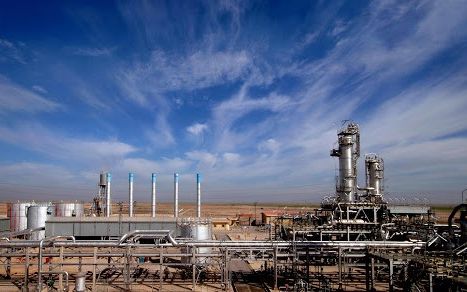
Signs that talks between US and Iranian officials may succeed could lower oil prices, traders said, after US and Brent crude reached multi-year highs on Friday.
If agreement is reached in Vienna to revive the 2015 nuclear agreement (JCPOA) with Iran and the United States lifts sanctions, it could boost oil shipments, adding about one million barrels a day to global supply.
Oil prices have risen sharply in past few months, nearing the important $100 pb threshold not seen since November 2014.
"There has been speculation that this rally was going to encourage some sanctions relief and get more Iranian oil on the market," John Kilduff, partner at Again Capital LLC in New York told Reuters.
On Friday, the United States restored sanctions waivers allowing international nuclear cooperation with Iran on projects designed to make it harder for Iran's nuclear sites to be used to develop weapons.
"President (Joe) Biden still wants us to negotiate in Vienna ... That's a symbol or a sign of our continued belief that it is not a dead corpse, that we need to revive it because it is in our interest," Rob Malley, U.S. envoy for Iran, told MSNBC Sunday night.
Iran on Monday demanded full removal of all sanctions imposed since 2018 when for US president Donald Trump withdrew from JCPOA.
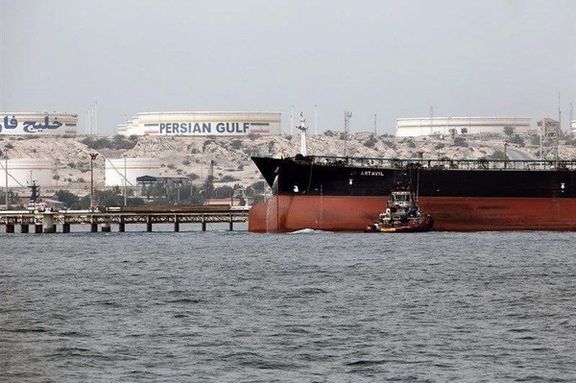
Iran’s oil export income grew by 494 percent in the first 5 months of the Raisi administration, Fars news agency affiliated with the Revolutionary Guard reported Tuesday.
The report is an attempt to shed a positive light on the embattled hardliner government, covering a range of budgetary and other economic indicators, but the claim about more oil exports is not too far from other estimates showing weakness in enforcing United States sanctions.
Fars said that from mid-August when Ebrahim Raisi took office until mid-January, Iran sold about $2.8 billion of oil and related products, while in the last four months of the previous administration oil exports totaled just $500 million. (The report mentions the figures in rials, and we converted the amounts using an average exchange rate of $1=250,000 rials.)
The Raisi administration and its political allies almost on daily basis try to show that his government has a far better record in economic performance, including circumventing Unites States’ sanctions.
Putting the two figures together, Iran is still far behind in meeting its budget estimate from oil revenues. The roughly $3.3 billion dollars accrued since the beginning of the Iranian fiscal year on March 21, 2021, constitutes less around 30 percent of the budget projection for oil sales in this fiscal year. Iran’s original projection was to export around $15 billion in this period.
Current estimates of oil sales vary widely, ranging from 650,000 to more than one million barrels a day, with China boosting its imports in the final months of last year. However, Iran sells it oil with a big discount, according to its own officials, but both the true volume of exported oil and its price remain a secret.
The $3.3 billion reported by Fars for total oil exports since August seems low, even if we take the lower estimated exports by the discounted price of $50 per barrel, Iran should have made close to $5 billion in five months. Therefore, there are three possibilities: The figures mentioned by Fars are wrong; the estimate of 650 barrels per day is too high; or Iran is offering buyers much steeper discounts.
Fars claims that its report is based on information collected from official sources.
The report also claims that borrowing from the central bank declined by 30 percent since raisi assumed office, but this assertion amounts to an accounting gimmick.
The government sold about $5.4 billion of “Islamic Bonds”, which is another term for indirect borrowing from the central bank. A large enough private capital market to digest billions of dollars in government bonds simply does not exist in a country which has had around $60 billion in capital flight since 2018. The bonds are simply sold to government-owned banks, which have their own liquidity problems and have to borrow from the central bank, which in turn prints money.
Officials and media have been warning about the huge increase in liquidity since 2017 and this is the secret to government’s financing amid US sanctions. But as more money gets printed, inflation skyrockets and the national currency’s exchange rate drops. One US dollar now buys eight times more rials than it did in 2017.
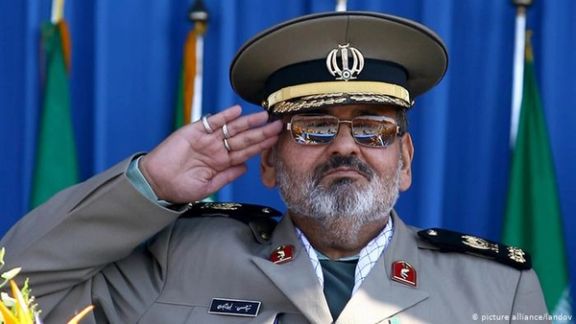
Britain has removed four dead Iranians from its sanctions list, possibly to help secure the release of two Britons jailed in Iran.
Such listing requires financial and banking institutions to freeze any funds held by the named individuals. A notice released by the United Kingdom Treasury Monday said Hassan Firouzabadi, Hassan Haddad, Ahmad Zargar, and Mohammad Hejazi had been withdrawn from the list of “persons, entities or bodies involved in the commission of serious human rights violations or abuse in Iran.”
Firouzabadi, who died in September, remains sanctioned by both the United States and European Union. Zargar is still listed by the EU, and Hejazi by the US, the EU, and the United Nations. All four were designated in 2011.
Firouzabadi was chief of staff of Iran’s armed forces from 1989 to 2016 before he was appointed a senior advisor to Supreme Leader Ali Khamenei. Hejazi was Khamenei’s intelligence and security advisor. Both were at some time commanders in Iran’s Revolutionary Guard and Basij paramilitary force.
Haddad and Zargar worked as judges and prosecutors in Revolutionary Courts. Haddad ordered a number of those protesting after the disputed 2009 presidential election to be arrested and sent to Kahrizak Detention Center, where prisoners were allegedly torturedandsome died.
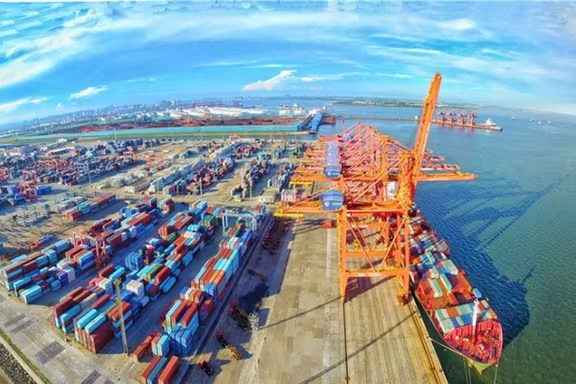
The ultra-conservative daily Kayhan in Tehran has claimed that Iran's oil exports have surged recently, giving leverage to its negotiators in the nuclear talks.
According to the Kayhan, "the growth in Iran's trade transactions and the boost in oil sales during the past few months have given the upper hand to Iranian negotiators in Vienna…and they insisted on the Iranian nation's essential demands and conditions."
The Kayhan, affiliated with Supreme Leader Ali Khamenei’s office, quoted Raisi as having said on social media: "Although hard work to eliminate the sanctions are seriously on the government's agenda, efforts to annul the sanctions are not limited to negotiations. Our oil sales have increased to such an extent that we have no financial concerns as the oil money is being repatriated."
The article appeared the same day when Khamenei delivered a speech to manufacturers, saying Iran has defeated the US sanctions and quoted the State Department spokesman to drive home his message.
In mid-January, Oil minister Javad Owji reaffirmed President Ebrahim Raisi's claim that Iran is exporting 40 percent more oil since August and is able to receive the money.
However, Iran’s oil exports had dropped to around 200,000 barrels per day in 2019 when the United States imposed full sanctions. But in late 2020, as former US President Donald Trump lost the election Tehran increased its sales through illicit channels. China is the biggest buyer, with shipments disguised as imports from other countries. Nonetheless, the increase can be hardly attributed to the Raisi administration's effort.
The daily also added that some US senators were annoyed by the development and called on the US President to take firm action against Iran by implementing the sanctions more rigorously.
The Kayhan was referring to a report that said ten Republican Senators wrote to President Joe Biden telling him he is endangering US national security by not enforcing Iranian oil export sanctions. The Senators, including Tom Cotton (R-Arkansas) and Ted Cruz in their letter dated January 28 told Biden that a growing fleet of non-Iranian oil tankers and buyers such as China are not afraid of US retaliation any longer and are trading in hundreds of thousands of barrels of crude oil a day.
The senators had reminded Biden that an increase in Iran's oil export will weaken the United States leverage in the nuclear negotiations in Vienna.
The Kayhan further claimed that it was Raisi's policy of expanding ties with Iran's neighbors and boosting the relations with Russia and China that has led to an increase in oil export. The daily also claimed that now it is Iran that is exerting maximum pressure on the United States. According to Kayhan, "Iran is not waiting for the JCPOA and the train of Iran's diplomacy has not stopped in Vienna."
Meanwhile, reformist daily Sharq during the week questioned the Raisi administration's "success" in boosting oil export and wrote: "As there are no official statistics about Iran's oil sales, it is not clear that the 40 percent rise in oil sales is in comparison to which period. Is it 40 percent more than last year? Or more than the same period in the previous year or more than all figures in the history of the oil industry?" Sharq also noted it is not clear how the oil money is being repatriated, "In dollars, in Euros in yens? And how and through which financial channels?"
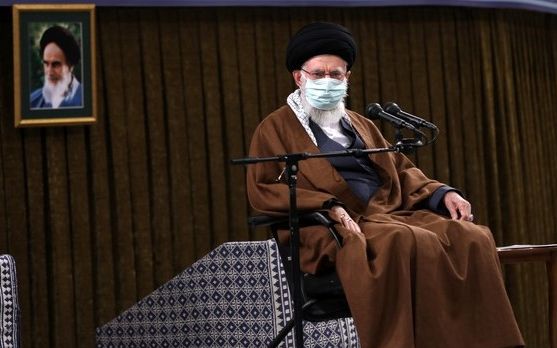
‘Maximum pressure’ sanctions by the United States have clearly failed, Iran’s Supreme Leader Ali Khamenei declared Sunday, quoting the US State Department.
Calling sanctions an “economic assault” Khamenei said that it caused some hardship for the people “but production did not buckle and the spokesman of America’s foreign ministry a few days ago frankly and explicitly announced that the maximum pressure policy has turned into a humiliating defeat for America.”
Khamenei was quoting State Department spokesman Ned Price who in his press briefing on January 25 said, “The maximum pressure campaign was an abject failure,” adding that former president Donald Trump’s policy did not change Iran’s behavior.
Iran’s economy went into a tailspin in 2018, when Trump withdrew from the 2015 nuclear agreement and imposed tough sanctions. Inflation skyrocketed and government budget deficits soared. The sanctions also impacted Iran’s proxy forces in the region, but they continued their destabilizing operations, although they could have been more effective without the sanctions.
In a speech to managers of Iran’s industrial and economic sectors Khamenei reiterated his ideology of self-reliance and called for “economic jihad” in defiance of sanctions, although he admitted that Iran’s economy performed very poorly in the last decade. At the same time, he claimed victory against US sanctions, that he said were meant to foment dissatisfaction among the people.
But as usual, the Supreme Leader blamed presidential administrations instead of the political and economic systems he presides over and his own policy of perpetually confronting the West and regional countries which have good ties with the United States.
Iran’s centralized economy plagued by corruption and mismanagement, as well as under the pressure of oil export sanctions has had zero growth in the past decade. Even before nuclear sanctions kicked in from 2011, its growth on average was anemic at under 3 percent since the early 1980s.
But Khamenei who has been in power since 1989, increasingly relied on loyal hardliners, and resorted to political persecutions and engineered elections instead of allowing a more accountable political system to take root. At the same time, insiders and the military took over the state-run economy using oil export revenues to perpetuate an unproductive system, as they enriched themselves.
In his speech Khamenei expressed disappointment at low GDP growth, lack of investments, a fast-growing liquidity problem leading to inflation and other serious problems the country faces. He emphasized however, that these difficulties are not just due to sanctions but also an outcome of “wrong decisions or lack of effort.”
He then mentioned a series of problems facing Iran’s domestic production sector, such as low quality of products, highlighting the auto industry which has been blamed for high fatalities in road accidents recently. Nevertheless, he reiterated that self-reliance should be the motto.
Khamenei and other insiders in the Islamic Republic system fail to understand or acknowledge that a modern economy can only grow with less government interference, more interaction with other economies, investments and competition. But the Supreme Leader’s domestic quest to reward supporters and continue a confrontational foreign policy, as well as a nuclear program with military ambitions foreclose paths toward economic success.